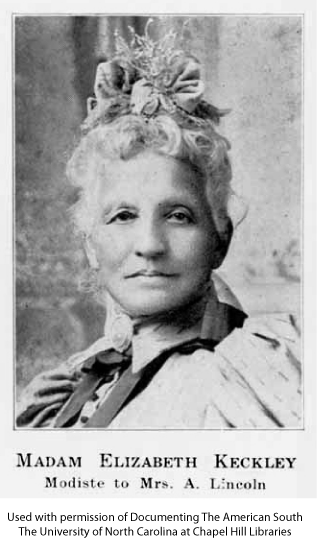Woman's History Wednesday: Spotlight - Elizabeth Keckley
Elizabeth Keckley was a well-known modiste or dressmaker, a confidante of Mary Todd Lincoln, a philanthropist, and an author.
She was born a slave in Dinwiddie Court-House, Virginia around 1818. In 1855, Keckley purchased her and her son’s freedom for $1,200 by using the seamstress skills that her mother had taught her and by gaining the support of her well-connected clients.
In 1860, Keckley moved to Washington D.C. Although she was required to have a license from the mayor to remain there, the resourceful Keckley obtained one with the assistance of friends. One of the first women she worked for as a modiste was Varina Davis, the wife of then-U.S. Senator Jefferson Davis of Mississippi. Keckley gained a reputation as an excellent dressmaker. In fact, First Lady Mary Todd Lincoln hired Keckley as her modiste the day after President Abraham Lincoln’s inauguration in 1861. Consequently, Keckley became an important part of the Lincoln White House community and was one of the first lady’s closest companions. According to Keckley’s account, she was the first person, and one of the only, that Mrs. Lincoln would see after her husband’s assassination.
In addition to her role at the White House, Keckley was also involved in her community. After witnessing a fundraiser for sick and wounded soldiers, Keckley was inspired to begin a similar organization to aid former slaves in the nation’s capital. In 1862, she founded the Contraband Relief Association, which provided food, clothing, and shelter to struggling African Americans displaced by war.
Keckley was also an author. She offers insight into her life and into the Lincoln White House in her memoir, “Behind the Scenes, or, Thirty Years a Slave, and Four Years in the White House.” Keckley writes about her time as a slave, and also describes First Lady Mary Todd Lincoln and their interactions. It was one of the first autobiographies of a former slave to be published following the Civil War.
Credit -
Credit The White House Historical Association










